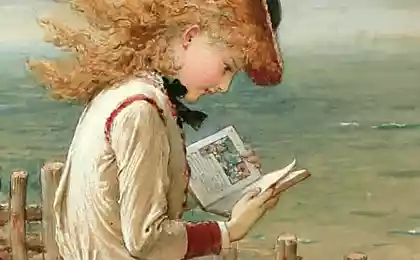800
How to instill in your child a love of reading: 4 methods
How to teach your baby and teen to love books tell the psychologist V. S. Yurkevich and the librarian Lyudmila lukzen.
Sixty six million two hundred thirteen thousand five hundred eighty
In reading there are two stages:
One) the stage of technical reading the so-called “naked” skill,
Two) stage reading when gripping from the content of the text.
The first stage does not bring pleasure, and moreover, if it be stuck, to remain more than time, a love of reading becomes problematic.
Ready-made recipes to teach child or adult to love reading there. So to begin withI will list what is in any case impossible to do, when your child had learned to read, but reading it is still only technical — that is, he still does not want to read and really (for yourself, for fun) doesn't even.
Read must from the very beginning to connect only with a sense of fun. No even thinking about repression. In any case, not to compel and not to persuade — Ah, read it a single line. Invent any maneuvers any game, but the child himself must want to read, though not immediately understand what he has read.
Enjoy each read a word child, realizing that this really his small victories.
Do not draw his attention to errors in reading, try to improve the most inconspicuous way, but if you can do without it, if not do not correct.
Take for first reading only suitable books bright, with big letters, lots of pictures and most importantly, a strong story, which was interesting to watch.
Eighty one million five hundred thirty four thousand nine hundred
And now for the maneuvers — their great variety, and that's what will help your child choose. Better, of course, invent your own.
Method Kassil
This method is good for a child who already reads quite easily, but does not like to read, and actually still is at the stage of advanced technical reading.
Select an interesting text with a compelling storyline and a parent reads to him, stopping suddenly on a cliffhanger, and then the father (mother, all domestic) is strictly there is no time to read to a child. The child reluctantly takes the book, hoping that after all someone will have mercy, and read him killed after all or not the main character. Home immediately praise the child for wanting to read and read still with him — you line, two lines I. And so on.
Of technical skill as strengthening goes in the content.
The method of the Spark daunis (child psychologist)
Once the child wakes up and finds under a pillow the letter from Carlson, where he's only two major lines tells him that he loves and wants to be friends with him, and a gift for him is there is something there. The gift in the right place is.
The child suspects a game, but still very happy.
The next morning another letter, which is already about the gift of a word, and said that he wanted to leave him tickets to the circus, but saw he was pulling the cat's tail, and she squealed. And because the circus tickets are postponed.
Every day letters long and are read faster.
The skill becomes meaningful, and the child with reading communicates a sense of fun and joy.
The method of the ancient people (who are also called People of the Book)
The child is allowed to read only when he is well behaved and not only offer the opportunity to read a few lines (or even half a page), but even bake special cookies in the form of booklet, which the child gets to celebrate a joyous moment.
Read — joy and celebration. And this child needs to know every time is taken for the book. If a child misbehaves, the book can not be read. However, this method was born when children started to read the Book (Holy book).
The method is illiterate Tartar women
It's a long story about how in the class for gifted children was a very gifted child, whose mother spoke Russian (and about to read I just don't know). I only know that she was at the Central Telegraph office only trusted tied with twine packages, everything else is considered work requiring more skill than she had.
The boy in four years mastered letters, but read, natural, badly and only for public.
This illiterate mother had, probably, a fantastic intuition. Judge.
They lived in a communal apartment, and they ran a neighbor — a woman Katya. And the boy Dian decided to boast of her that already knows how to read. I began to read and, of course, badly and with mistakes. Baba Katya decided povospityvat boy, I should say they already know how to read? Learn how to, then brag.
That here became with mother! Why you offend my child is rushed to protect the son of an illiterate mother. He began to read. And you appetite to spoil the reading (and said!). And a few years later her black eyes at the story were shone with indignation. — I kicked her out — she said — and told this woman Kate — not able with the child do not go here. And she went to me.
Further — more. Mother earns very little and, of course, sit almost on one potato. So, every day she asked her son to help her when she is peeling potatoes, anything to read to her. Then she explained to the son, handles hurt less. The son willingly agreed. And here mother goes to peel potatoes, and the son sits on a little stool and read. Badly still reads and sees tears at mother, mother why are you crying?
— I son, illiterate, and you, the scientist and many books will read.
— Yes, mother. I'm a scientist.
And so three times a day. And every time I asked mother when we go to peel potatoes when I'm read to handle you was not sick. In five years they went to regional children's library. And now the son became very good mathematician and works in Princeton.
Tips of the librarian (she lukzen)
Sixty four million nine hundred eighty three thousand four hundred seventy three
The psychologists: to instill a love of books and reading is possible only up to 9 years. Too late to do very difficult and sometimes almost impossible. So the main task of educating readers falls on the shoulders of parents who, ideally, has to rely in this work on assistance to children's libraries. Because all parents want to see their children healthy, happy. And they all, without exception, want to teach your child how to succeed. First of all, he needs to learn to read and write.
And this process begins in the family, not the school, as is commonly believed. School is just learning to read and write. We're talking about loving the book, the pleasure from the process of reading, the habit of being constantly with the book and the impossibility to exist without it. And this is not the prerogative of the school, and absolutely a “family” business. Parents tell children stories at night and answer the many “why?”. Only the parents spend with their child rainy morning in the library with him considering and choosing books.
“I want ice cream (a chocolate, a toy etc.),” says your child is right for YOU, when you go with him for shopping. That is, to the parents, as the closest and most influential (yet) for them, people turn to the kids for advice and assistance with the request. Therefore, early age — the most fertile time in order to develop in your child a love of books and reading.
How to do it? Here are some useful and interesting ideas.
To begin with — the answers to questions that often arise for parents.
When to read?
— as soon as the baby is born;
— select a few minutes, but every day;
— choose a time when the child is in a good mood;
— to teach the child the “wait” time to read;
— read anywhere;
— to comfort the child, showing a beautiful book, when he cries or is naughty.
How to read?
— choose a convenient and comfortable place;
— read to the kid by heart poems that you yourself remembered from childhood;
— find books that you can give to a child to hold in the hands;
— consider books and pictures;
— to read with “expression”;
— allow the child to “choose” book;
— reread favorite books.
Now in more detail at some of the most important tips from librarians and psychologists about how to instill in your child a love of reading.
Forty five million thirty five thousand three hundred thirty eight
1. Psgovarivayas, sing and play with your child
The kids enjoy listening to your speech: when we bathe and dress, eat or fall asleep in the evening and at dawn.
So, growing up, the child who talked all the time, starts faster to understand and reproduce all the words heard when (as it seemed to you) he still didn't understand. He had loved the songs and poems. He can not do without your stories and cooperative games.
Talk to him about all simple for you but very important for a child, the things that you do together every day. Comment your actions: “my hands”, “sit on chair” describe what you see — so you are preparing an attentive listener.
2. Make time for reading every day
Begin to read from the first months of life. Reading to the kid, how would you expand his world, helping him to enjoy reading, restock his knowledge and vocabulary. The child learns to listen to a book, turn pages by gliding a finger from left to right, remembers the words that he sees and hears.
The kids love the regular (and not from time to time) read with their parents! Choose a short period of time when you can relax and take your time before going to sleep, or when you have a break in the household chores.
Don't forget that your child can read grandparents, older brother or sister, any family member. Come to the library where he can read a more adult readers. All times refer to books and reading.
Buy a few books home to make your little one would bother with them.
3. Choose books with your child
Reading with your child together constantly, you will definitely notice what books he likes more than what he knows best. Enlist the help of the library and the librarian in the selection of books similar to these. After all, the library has books for every age and level of development. In addition, professionals are easier to find books than you yourself.
Do not assume that all the necessary baby books you have at home is a mistake many reading parents. And not only because the home libraries can not be more diverse public. Your child just example can inspire other children to read. So many many books! It is very important for the formation of a small reader, who is brought up on imitation. Other readers like to pass the baton to your child. This will help him to get used to variety of books, to the reading behavior of children and adults and will surely affect later life, study, prepare for school.
The world of books and the library will not be for him unknown country. “How many interesting books and you can read them all yourself.” So there is an incentive to reading.
4. Surround the child with things to read
Not only books from the library must be the child. Must be your own. Any? First of all, those in which he can not only read, but also to paint a picture of something on their own to cut or make to make a record. Many of these books and they are for strictly personal use.
You can make and homemade books. Help your toddler glue, sign or stitch your own book with drawings, photographs and other interesting things. You can help your child to write the text he wants to put in his notebook.
Odobriti, inspire and encourage the work of the kid, as well as reading his own books for all family members.
5. Slowly and with pleasure
It is not important What you read, but As you read! When you read quickly and monotonously, the child quickly loses interest. Read emotionally, taking pleasure in reading themselves. Be actors (think of the unrealized dreams of becoming a “movie Star”!). Try to read different voices for different characters, conveying their character. Your kid will love it! Read, interrupting reading conversational pauses, looking at the pictures in the book. This will give the baby time to think about what he hears, to “digest” what they read, to understand the events and the characters.
Be sure to ask questions themselves and answer to those that will arise from the baby, listen to how he talks and conveys his impressions from reading.
Keep an eye on while reading to the child. Sometimes he clearly does not want to stop reading especially if the story is unfamiliar, and he hears it for the first time. Sometimes he wants to look at pictures, to ask you what the book is about. Be indulgent and do not stop it. Reading should be fun!
Remember, reading books is an ambitious rehearsal and predestination of the future attitude to learning.
Thirty million seven hundred five thousand eight hundred thirty seven
6. Read again and again
As you know, children often like to hear the same story. They force you to read already due to the teeth books again and again. As to your offer to read or tell something new, often a refusal.
What to do in this case? Look at the title of this Board! Yes! Read exactly what he asks. It is not a whim. The child wishes to understand the book more deeply, the process of learning it slower he gets from reading pleasure. Do not deprive him of all this. It is preparing for the future a thoughtful and attentive reading, education to fully appreciate the book.
It is hard for you for the twentieth time to re-read “Masha and the bear”? To attract to the process of all family members. Give to the child opportunity to be proud of yourself and pretend he this book “reads”.
I remember my oldest daughter (who later in the physico-mathematical class) all got the book “the adventures of Lubarika and Tomatika, or a Fun math” and the younger “Cinderella”. Moreover, the reaction to a missed (to save time) the passage was instantaneous.
So if the book makes fun of the child, and he speaks to her constantly, read to him as many times as the child wants.
7. Read everywhere and always
You can read everywhere and always: on a walk on the beach, on a trip, waiting for the doctor. Let your bag with baby accessories, toys, bottles and nipples definitely is a book.
When your child learns to discriminate letters and to read by syllables, encourage the reading of signs.
8. Do not force your child to read
Never seat for reading (with parents or alone), if the kid doesn't want that. This is one of the most effective ways to kill his interest in reading the book. Wants — leave him alone or engage with reading. Read under duress — the way to neotenia at all. And if your already grown up child, the child who only reads comic books or primitive edition — refrain from criticism. Remember: he's reading! Look for positive and effective way to his soul more interesting and more important books. Choose the most popular among children of topics and books (you will always come librarians) and get ready for a long search path, favorite books, interesting topics and authors.
Also interesting: James Patterson: a reader's gift children can pass only one who owns it
The 20 best books to read to children before bedtime
9. Show your child your interest in his reading
There is nothing more important for the education of the reader than developing the love of reading. Be the Great Guides to the world of books, but not a Great Drivers and Evaluators of what and how your child reads.
When your child learns to read by himself, ask him to read to you. Not a lesson given in the school, and just a good story, until you do something with your hands, in the kitchen, for example. If the child makes mistakes while reading, then when the error does not matter for the perception of the text, not fix it.published
P. S. And remember, only by changing their consumption — together we change the world! ©
Source: vk.com/readwithkid?w=wall-46053087_17981
Sixty six million two hundred thirteen thousand five hundred eighty
In reading there are two stages:
One) the stage of technical reading the so-called “naked” skill,
Two) stage reading when gripping from the content of the text.
The first stage does not bring pleasure, and moreover, if it be stuck, to remain more than time, a love of reading becomes problematic.
Ready-made recipes to teach child or adult to love reading there. So to begin withI will list what is in any case impossible to do, when your child had learned to read, but reading it is still only technical — that is, he still does not want to read and really (for yourself, for fun) doesn't even.
Read must from the very beginning to connect only with a sense of fun. No even thinking about repression. In any case, not to compel and not to persuade — Ah, read it a single line. Invent any maneuvers any game, but the child himself must want to read, though not immediately understand what he has read.
Enjoy each read a word child, realizing that this really his small victories.
Do not draw his attention to errors in reading, try to improve the most inconspicuous way, but if you can do without it, if not do not correct.
Take for first reading only suitable books bright, with big letters, lots of pictures and most importantly, a strong story, which was interesting to watch.
Eighty one million five hundred thirty four thousand nine hundred
And now for the maneuvers — their great variety, and that's what will help your child choose. Better, of course, invent your own.
Method Kassil
This method is good for a child who already reads quite easily, but does not like to read, and actually still is at the stage of advanced technical reading.
Select an interesting text with a compelling storyline and a parent reads to him, stopping suddenly on a cliffhanger, and then the father (mother, all domestic) is strictly there is no time to read to a child. The child reluctantly takes the book, hoping that after all someone will have mercy, and read him killed after all or not the main character. Home immediately praise the child for wanting to read and read still with him — you line, two lines I. And so on.
Of technical skill as strengthening goes in the content.
The method of the Spark daunis (child psychologist)
Once the child wakes up and finds under a pillow the letter from Carlson, where he's only two major lines tells him that he loves and wants to be friends with him, and a gift for him is there is something there. The gift in the right place is.
The child suspects a game, but still very happy.
The next morning another letter, which is already about the gift of a word, and said that he wanted to leave him tickets to the circus, but saw he was pulling the cat's tail, and she squealed. And because the circus tickets are postponed.
Every day letters long and are read faster.
The skill becomes meaningful, and the child with reading communicates a sense of fun and joy.
The method of the ancient people (who are also called People of the Book)
The child is allowed to read only when he is well behaved and not only offer the opportunity to read a few lines (or even half a page), but even bake special cookies in the form of booklet, which the child gets to celebrate a joyous moment.
Read — joy and celebration. And this child needs to know every time is taken for the book. If a child misbehaves, the book can not be read. However, this method was born when children started to read the Book (Holy book).
The method is illiterate Tartar women
It's a long story about how in the class for gifted children was a very gifted child, whose mother spoke Russian (and about to read I just don't know). I only know that she was at the Central Telegraph office only trusted tied with twine packages, everything else is considered work requiring more skill than she had.
The boy in four years mastered letters, but read, natural, badly and only for public.
This illiterate mother had, probably, a fantastic intuition. Judge.
They lived in a communal apartment, and they ran a neighbor — a woman Katya. And the boy Dian decided to boast of her that already knows how to read. I began to read and, of course, badly and with mistakes. Baba Katya decided povospityvat boy, I should say they already know how to read? Learn how to, then brag.
That here became with mother! Why you offend my child is rushed to protect the son of an illiterate mother. He began to read. And you appetite to spoil the reading (and said!). And a few years later her black eyes at the story were shone with indignation. — I kicked her out — she said — and told this woman Kate — not able with the child do not go here. And she went to me.
Further — more. Mother earns very little and, of course, sit almost on one potato. So, every day she asked her son to help her when she is peeling potatoes, anything to read to her. Then she explained to the son, handles hurt less. The son willingly agreed. And here mother goes to peel potatoes, and the son sits on a little stool and read. Badly still reads and sees tears at mother, mother why are you crying?
— I son, illiterate, and you, the scientist and many books will read.
— Yes, mother. I'm a scientist.
And so three times a day. And every time I asked mother when we go to peel potatoes when I'm read to handle you was not sick. In five years they went to regional children's library. And now the son became very good mathematician and works in Princeton.
Tips of the librarian (she lukzen)
Sixty four million nine hundred eighty three thousand four hundred seventy three
The psychologists: to instill a love of books and reading is possible only up to 9 years. Too late to do very difficult and sometimes almost impossible. So the main task of educating readers falls on the shoulders of parents who, ideally, has to rely in this work on assistance to children's libraries. Because all parents want to see their children healthy, happy. And they all, without exception, want to teach your child how to succeed. First of all, he needs to learn to read and write.
And this process begins in the family, not the school, as is commonly believed. School is just learning to read and write. We're talking about loving the book, the pleasure from the process of reading, the habit of being constantly with the book and the impossibility to exist without it. And this is not the prerogative of the school, and absolutely a “family” business. Parents tell children stories at night and answer the many “why?”. Only the parents spend with their child rainy morning in the library with him considering and choosing books.
“I want ice cream (a chocolate, a toy etc.),” says your child is right for YOU, when you go with him for shopping. That is, to the parents, as the closest and most influential (yet) for them, people turn to the kids for advice and assistance with the request. Therefore, early age — the most fertile time in order to develop in your child a love of books and reading.
How to do it? Here are some useful and interesting ideas.
To begin with — the answers to questions that often arise for parents.
When to read?
— as soon as the baby is born;
— select a few minutes, but every day;
— choose a time when the child is in a good mood;
— to teach the child the “wait” time to read;
— read anywhere;
— to comfort the child, showing a beautiful book, when he cries or is naughty.
How to read?
— choose a convenient and comfortable place;
— read to the kid by heart poems that you yourself remembered from childhood;
— find books that you can give to a child to hold in the hands;
— consider books and pictures;
— to read with “expression”;
— allow the child to “choose” book;
— reread favorite books.
Now in more detail at some of the most important tips from librarians and psychologists about how to instill in your child a love of reading.
Forty five million thirty five thousand three hundred thirty eight
1. Psgovarivayas, sing and play with your child
The kids enjoy listening to your speech: when we bathe and dress, eat or fall asleep in the evening and at dawn.
So, growing up, the child who talked all the time, starts faster to understand and reproduce all the words heard when (as it seemed to you) he still didn't understand. He had loved the songs and poems. He can not do without your stories and cooperative games.
Talk to him about all simple for you but very important for a child, the things that you do together every day. Comment your actions: “my hands”, “sit on chair” describe what you see — so you are preparing an attentive listener.
2. Make time for reading every day
Begin to read from the first months of life. Reading to the kid, how would you expand his world, helping him to enjoy reading, restock his knowledge and vocabulary. The child learns to listen to a book, turn pages by gliding a finger from left to right, remembers the words that he sees and hears.
The kids love the regular (and not from time to time) read with their parents! Choose a short period of time when you can relax and take your time before going to sleep, or when you have a break in the household chores.
Don't forget that your child can read grandparents, older brother or sister, any family member. Come to the library where he can read a more adult readers. All times refer to books and reading.
Buy a few books home to make your little one would bother with them.
3. Choose books with your child
Reading with your child together constantly, you will definitely notice what books he likes more than what he knows best. Enlist the help of the library and the librarian in the selection of books similar to these. After all, the library has books for every age and level of development. In addition, professionals are easier to find books than you yourself.
Do not assume that all the necessary baby books you have at home is a mistake many reading parents. And not only because the home libraries can not be more diverse public. Your child just example can inspire other children to read. So many many books! It is very important for the formation of a small reader, who is brought up on imitation. Other readers like to pass the baton to your child. This will help him to get used to variety of books, to the reading behavior of children and adults and will surely affect later life, study, prepare for school.
The world of books and the library will not be for him unknown country. “How many interesting books and you can read them all yourself.” So there is an incentive to reading.
4. Surround the child with things to read
Not only books from the library must be the child. Must be your own. Any? First of all, those in which he can not only read, but also to paint a picture of something on their own to cut or make to make a record. Many of these books and they are for strictly personal use.
You can make and homemade books. Help your toddler glue, sign or stitch your own book with drawings, photographs and other interesting things. You can help your child to write the text he wants to put in his notebook.
Odobriti, inspire and encourage the work of the kid, as well as reading his own books for all family members.
5. Slowly and with pleasure
It is not important What you read, but As you read! When you read quickly and monotonously, the child quickly loses interest. Read emotionally, taking pleasure in reading themselves. Be actors (think of the unrealized dreams of becoming a “movie Star”!). Try to read different voices for different characters, conveying their character. Your kid will love it! Read, interrupting reading conversational pauses, looking at the pictures in the book. This will give the baby time to think about what he hears, to “digest” what they read, to understand the events and the characters.
Be sure to ask questions themselves and answer to those that will arise from the baby, listen to how he talks and conveys his impressions from reading.
Keep an eye on while reading to the child. Sometimes he clearly does not want to stop reading especially if the story is unfamiliar, and he hears it for the first time. Sometimes he wants to look at pictures, to ask you what the book is about. Be indulgent and do not stop it. Reading should be fun!
Remember, reading books is an ambitious rehearsal and predestination of the future attitude to learning.
Thirty million seven hundred five thousand eight hundred thirty seven
6. Read again and again
As you know, children often like to hear the same story. They force you to read already due to the teeth books again and again. As to your offer to read or tell something new, often a refusal.
What to do in this case? Look at the title of this Board! Yes! Read exactly what he asks. It is not a whim. The child wishes to understand the book more deeply, the process of learning it slower he gets from reading pleasure. Do not deprive him of all this. It is preparing for the future a thoughtful and attentive reading, education to fully appreciate the book.
It is hard for you for the twentieth time to re-read “Masha and the bear”? To attract to the process of all family members. Give to the child opportunity to be proud of yourself and pretend he this book “reads”.
I remember my oldest daughter (who later in the physico-mathematical class) all got the book “the adventures of Lubarika and Tomatika, or a Fun math” and the younger “Cinderella”. Moreover, the reaction to a missed (to save time) the passage was instantaneous.
So if the book makes fun of the child, and he speaks to her constantly, read to him as many times as the child wants.
7. Read everywhere and always
You can read everywhere and always: on a walk on the beach, on a trip, waiting for the doctor. Let your bag with baby accessories, toys, bottles and nipples definitely is a book.
When your child learns to discriminate letters and to read by syllables, encourage the reading of signs.
8. Do not force your child to read
Never seat for reading (with parents or alone), if the kid doesn't want that. This is one of the most effective ways to kill his interest in reading the book. Wants — leave him alone or engage with reading. Read under duress — the way to neotenia at all. And if your already grown up child, the child who only reads comic books or primitive edition — refrain from criticism. Remember: he's reading! Look for positive and effective way to his soul more interesting and more important books. Choose the most popular among children of topics and books (you will always come librarians) and get ready for a long search path, favorite books, interesting topics and authors.
Also interesting: James Patterson: a reader's gift children can pass only one who owns it
The 20 best books to read to children before bedtime
9. Show your child your interest in his reading
There is nothing more important for the education of the reader than developing the love of reading. Be the Great Guides to the world of books, but not a Great Drivers and Evaluators of what and how your child reads.
When your child learns to read by himself, ask him to read to you. Not a lesson given in the school, and just a good story, until you do something with your hands, in the kitchen, for example. If the child makes mistakes while reading, then when the error does not matter for the perception of the text, not fix it.published
P. S. And remember, only by changing their consumption — together we change the world! ©
Source: vk.com/readwithkid?w=wall-46053087_17981























